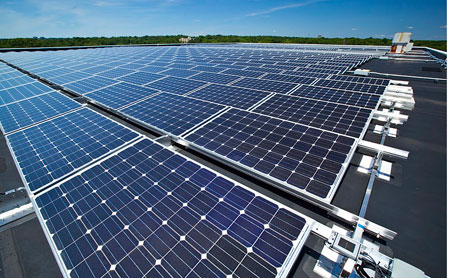COLLEGE PARK – Tax breaks and a reduced carbon footprint offer strong incentives for homeowners to consider installing solar panels.
But during hurricane season, alternative energy experts say homeowners should also consider another less known benefit of solar: its performance after a major storm.
In the wake of a natural disaster, homes with solar panels can get the lights back on and the refrigerator cooled much more quickly than those without.

“If you’re able to generate electricity on your roof, then you’re not going to be as dependent on the grid if it goes out,” said Amanda Staudt, senior scientist at the National Wildlife Federation.
Disruption to the power grid during Hurricane Irene left around 800,000 Marylanders without power for several days, according to the Maryland Energy Administration. The number of power outages linked to extreme weather have increased tenfold since 1992 according to the United States Global Change Research Program’s analysis of data from the U.S. Energy Information Administration.
“All of the model projections suggest that these problems are going to get more severe,” Staudt said.
Homeowners looking to install solar panels have several options from which to choose – not all of which are equally reliable after a major storm. Some systems — “grid-tied” — are connected directly into the electrical grid, and some — “off-grid” — operate independently.
Off-grid solar panels, which are powered by an independent battery backup, can provide
energy even when a major storm knocks out the electrical grid. But they’re generally more expensive than systems that are tied to the grid.
The Maryland Energy Association offers grants to those who purchase grid-tied systems.
And in many cases, homeowners can sell excess energy generated by their solar panels to power companies.
Grid-tied systems, though, are less effective after a major storm. They use supplemental energy from the power grid to operate, and automatically switch off when the grid is down. Some grid-tied systems can be equipped with battery backups to continue working after a natural disaster.


You must be logged in to post a comment.